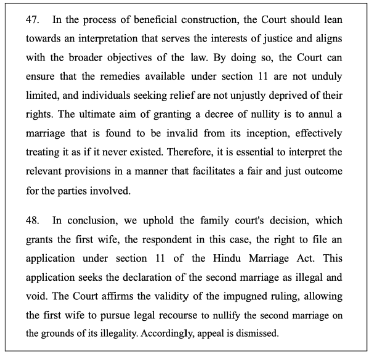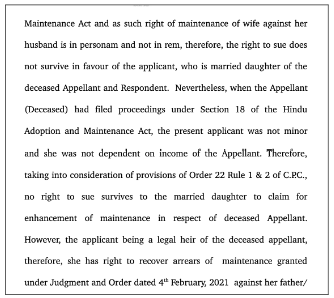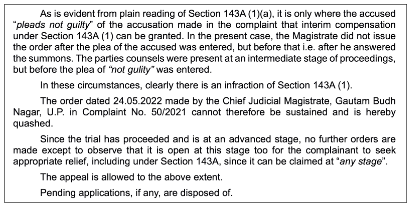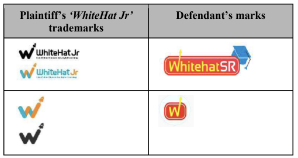In this week’s review of Court Judgments, we look at the Allahabad High Court upholding the rights of first wife to file application to void husband’s second marriage, Bombay High Court’s observation that Daughter cannot continue mother’s maintenance claim after her death, Calcutta High court’s verdict relating to allegation of theft by husband against his estranged wife, Supreme Court’s order regarding a Cheque dishonour case and Delhi High Court’s verdict regarding a case of similar logo.
Allahabad HC: First wife can file applications under Hindu Marriage act for declaration of husband’s second marriage as void.
Allahabad High Court held that the Hindu Marriage Act is a social welfare legislation and intends to protect the rights of the first wife. It upheld the rights of the first wife to file an application under Section 11 (void marriages) of the Hindu Marriage Act, 1995, for the declaration of her husband’s second marriage as void.
As per the details of the case, Garima Singh vs. Pratima Singh and Another 2023, the second wife approached the High Court claiming that the first wife could not file a case under section 11 of the Hindu Marriage Act, 1955, against her and her husband (who is deceased) as only parties to the marriage agreement can file for declaration under Section 11.
The division bench was dealing with the question, of whether the first wife is entitled to file a case under sections 11 & 17 of the Hindu Marriage Act, 1955, for declaring her husband’s marriage with another woman, as null and void.
The court observed and held that the Hindu Marriage Act is a social welfare legislation and needs to be interpreted in a manner that advances the object of the legislation. It stated that purposive interpretation should be adopted while implementing socio-welfare legislations.
On the question of the reference to “party” in Section 11 of the Hindu Marriages Act, the court interpreted that it refers to anyone aggrieved by the solemnization of a second marriage having the option to file a suit in the family court.
It did not agree with the reasoning by the Single judge of the Allahabad High Court in an earlier case, Lakshmi Ammal vs. Ramaswami Naicker, wherein it noted that an application under Section 11 could only be filed by the parties who are party to the marriage.
The two-judge bench comprising of Justices Saumitra Dayal Singh and Vinod Diwakar observed that the object of the Hindu Marriage Act was to eliminate the practice of polygamy and the court must interpret and apply the law to achieve objective of legislation.

Bombay HC: Daughter cannot continue mother’s maintenance claim after her death
Bombay High Court bench consisting of Justice Ravindra V Ghuge and Justice YG Khobragade, held that daughter cannot continue her mother’s claim of maintenance from her husband after her death, as the right to claim maintenance under the Hindu Adoption and Maintenance Act (HAMA) is an individual right against another person.
As per the details of the case, Jayshree @ Pushpa vs. Satyendra s/o Shivram Jindam, one Jayashree filed an application under Section 18 of HAMA, seeking enhancement of maintenance awarded to her from her husband – Satyanedra Jindam. She is now deceased, and her married daughter sought to continue the case and filed the present application seeking her to be recognised as her mother’s legal heir.
In the application, it was noted that initially, the relationship between her parents was cordial which strained in later years and eventually led to separate living arrangements. Jayashree filed a petition before the Family Court, in Nanded, seeking maintenance of Rs. 1.5 lakhs per month. However, the family court granted maintenance of Rs.10 thousand per month. She filed an appeal under Section 19 of the Family Courts Act seeking enhancement to the maintenance. In the meantime, she passed away, while the appeal was still pending in the court. Her daughter argued that as a legal heir, she has the right to continue with the appeal.
The question before the courts was whether the right to sue survives with the legal heirs of the deceased in the case for enhancement of maintenance under personal law and more specifically under the Hindu Adoption and Maintenance Act.
The respondent i.e., husband of the deceased argued that the right to maintenance under the act is limited to legally wedded wife and children and the right to claim maintenance is personal in nature and ceases upon the death of the person who claimed maintenance under the statute.
The court examined the legal provisions including Order 22 Rules 1 & 2 of the CPC. The court noted that the right to claim maintenance under personal laws like the HAMA, is an individual prerogative right and is specific to an individual.
The court rejected the application holding that the appeal has abated as right to sue for enhancement of maintenance does not survive for the married daughter in respect of her deceased mother’s claim. The court clarified that the daughter can, however, recover any arrears of maintenance granted against her father as a legal heir, after obtaining a succession certificate from the competent court of law.

Calcutta HC: Woman taking regular worn ornaments when leaving matrimonial home after 29 years can’t be basis for criminal proceedings
A single judge bench of Justice Shampa (Dutt) Paul of Calcutta High Court recently quashed the criminal proceedings initiated against a woman by her husband, for the alleged theft of certain gold ornaments and valuables from her matrimonial home. It noted that the items she was accused of stealing were worn on a regular basis by traditional Bengali married women.
As per the details of the case, Mithu Dash @ Bhuiya vs. State of West Bengal & Anr, the petitioner had been married to the complainant since 1999 and due to tremendous torture since marriage, she lodged a complaint for a commission of offences of domestic violence.
She submitted that as a counter to her complaint, her husband who was a practicing advocate filed a police case against her under Section 420 of the IPC for the offence of theft. She further alleged that the husband initiated numerous malicious criminal proceedings against her and that he had even preferred an application under Section 125 CrPC for maintenance from the petitioner, which was later withdrawn. The petitioner submitted that she had preferred an application for the dissolution of her marriage with the complainant under Section 27 of the Special Marriage Act, which was still pending, and that due to the husband’s status as a practicing advocate, it became difficult for her to find legal representation for herself.
Counsel for the petitioner argued that, in pursuance of the investigation in one of the aforesaid cases, the Magistrate had issued a search warrant for the recovery of articles belonging to the complainant. It was argued that such an order was an “abuse of process”.
It was submitted by the husband that there were sufficient materials on record against the petitioner, to proceed to trial.
Upon perusing the materials on record and the arguments of the parties, the court noted that these ornaments/accessories as described, are worn on a regular basis by a traditional Bengali married woman, who chooses to wear them. The phones which might be for her own use and the ornaments as described, cannot be the basis of a criminal case between a married couple, that too, after 29 years of marriage. These allegations clearly do not make out any case as alleged under the Indian Penal Code against the petitioner and thus, this is a fit case where the inherent powers of this court should be exercised.
The Court allowed the instant revision application and noted that the allegations against the petitioner did not make out any case under the IPC, and thus the impugned proceedings were liable to be set aside. In light of the difficulties faced by the petitioner in finding representation, the Court further apprised the petitioner of her right to representation in legal proceedings.

Supreme Court: In a Cheque dishonour case, interim compensation can be ordered to be paid only after accused pleads not guilty
In the case Pawan Bhasin vs. the State of UP, the Supreme Court held that where a cheque is dishonoured, the interim compensation can be directed to be paid only after the accused has pleaded not guilty as per section 143A(1) of the Negotiable Instruments Act, 1881.
The Supreme Court bench led by Justices Ravindra Bhat and Aravind Kumar was hearing a Special Leave Petition preferred by the petitioners against Allahabad HC’s order which did not find any illegality in the summoning order.
As per the details of the case, there was a financial relationship between the petitioner (in this SLP) and the complainant for which cheques were issued. The complaint was that to satisfy the loan as well as the benefit, the cheque was given which was dishonoured.
The counsel appearing for the appellant argued that the order requiring such a deposit was made by the Magistrate at a stage prior to when notice under Section 251 was sent to the accused petitioner.
The counsel appearing on behalf of the respondent argued that the trial has proceeded to its final stage. The complainant’s evidence as well as the appellant’s statements have been recorded. So, no prejudice would be caused to the appellant.
The issue before the court was whether, in a cheque dishonour case, interim compensation can be granted even before the accused pleads not guilty under section 143A(1) of NI Act, 1881
The Court after analysing section 143A(1) held that direction for payment of interim compensation can only be made after the accused has pleaded not guilty. Accordingly, the trial court’s order was untenable in law and quashed. However, it also held that the trial was at an advanced stage, therefore, the complainant can seek relief, even under section 143A since it can be claimed at any stage.

Delhi HC: ‘Whitehat SR” deceptively similar to ‘WhiteHat Jr” mark, can’t be permitted to be used in physical or online platforms.
In the case of Whitehat Education Technology Pvt. Ltd vs Vinay Kumar Singh, Delhi High Court was dealing with a suit filed by WhiteHat Education Technology Private Limited against Vinay Kumar Singh who was providing services related to digital and online marketing, web development through the domain name or website www.whitehatsr.in.
It was alleged that the structural similarity of the “W” logo used by Singh, with an arrow pointing upwards, to WhiteHat Jr’s logo with a rocket launching upwards, indicated a deliberate design to deceive customers.
Disposing of the suit, the Court observed that Singh cannot be permitted to use the impugned mark “Whitehat SR” either in physical or online platforms in any manner whatsoever. It permanently restrained an individual from using the ‘Whitehat SR’ mark, logos, or any name which is an either identical or deceptively similar variant of the mark “WhiteHat Jr” which is registered in favour of an online coding tutoring platform for children.
The Court also directed Godaddy.com to transfer the domain name www.whitehatsr.in upon payment of requisite charges, if any.



